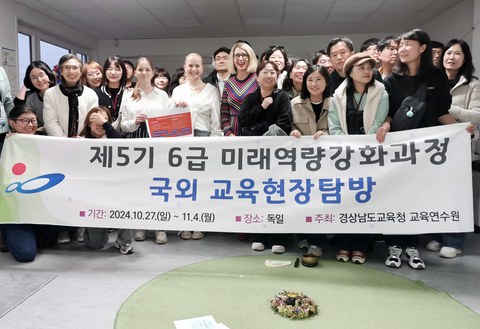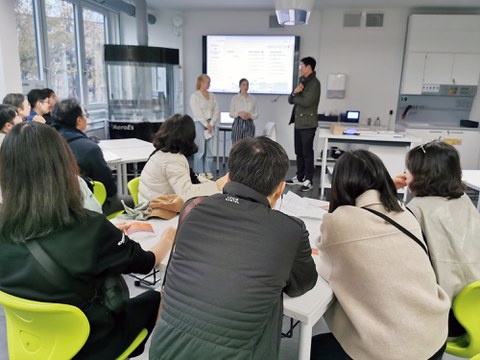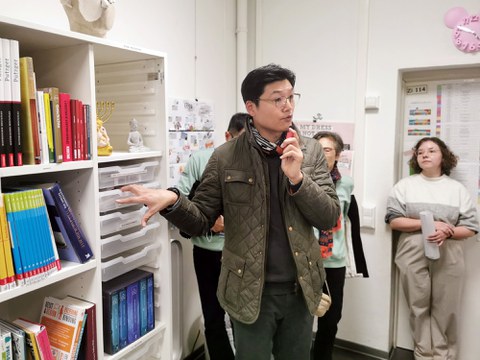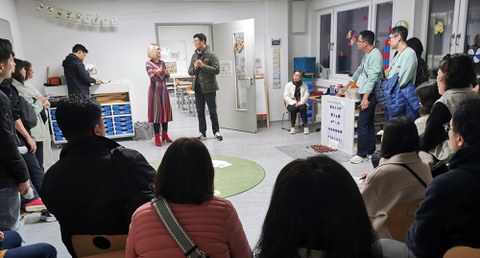Nov 01, 2024
Education experts from South Korea visit Dresden University School

27 teachers and representatives of the education authority of the South Korean province of Gyeongsangnam-do visited Dresden University School on 30 October.
On October 30, 2024, 27 teachers and representatives of the school board of the South Korean province of Gyeongsangnam-do visited Dresden University School as part of the educational tour through Germany to "Improve future skills of grades 5 and 6". The tour group was particularly interested in the question of how the didactic concept of the school trial researching the "School of the Future" implements self-regulated learning and learning with a strong connection to life and the world of work.
Planning and documenting self-regulated learning with the support of a school and learning management software
Two students from the qualification level (grades 9-10) first introduced the education experts to the digitally supported school organization. They presented the planning of their individual learning day and the documentation of their personal learning progress in the learning paths, mapped in the school's own learning and school management software. This software is constantly being further developed together with the TU Dresden in line with the needs of the school community.
After a short Q&A, the delegation was able to explore the environment prepared for independent learning in a specialist studio (subject perspective GeWi - social sciences, qualification level). The learning modules "Lernbausteine" and additional resources are freely accessible and clearly arranged in the material cupboards.
Learning modules instead of textbooks allow students to learn at their own pace and according to their interests
Wiebke Berjürgen, research associate at the ForUS - University School Research Unit at TU Dresden, explained the first steps in using ChatGPT to create the so called Lernbausteine. With these learning modules made up of varied tasks for individual learning in a small booklet, students at the qualification level can work on the topics in history, geography, social studies and ethics / religion in school years 9 to 10 in the order that suits them best - for example, based on the topics of the current project cycle - and at their own pace. They complete each learning module with a proof of success. This can be a knowledge test, a presentation in the form of a poster or PowerPoint or even a piece of artwork such as a 3D model.
The learning modules have so far been created by the learning guides at the respective levels (basic level 1-3, intermediate level 4-6, youth level 7-8, qualification level 9-10, grammar school level 11-12) for interdisciplinary learning in the areas of languages, social sciences, as well as math and science. They are available in the materials cupboard for everyday use. Additional lesson planning as in traditional face-to-face teaching is no longer necessary.
"A chatbot programmed for this purpose can be used to generate high-quality drafts for learning modules" Wiebke Bergjürgen explained. Before future use with the pupils, these would be checked and adapted by the subject teachers.
Focus on the individual learning path and the school as a learning community
In the following discussion with principal Maxi Heß, the group learned about the didactic concept for self-determined learning in the primary level (cross-year groups of grades 1-3) as well as the implementation in the more haptically designed learning environment. There was hardly enough time for the numerous questions during this visit. "Are the teachers not overburdened by the close supervision of each individual pupil?," she answered with a reference to personal satisfaction of the staff, because "there is always a lot to do at the Unischule!" However, if this work takes place in an environment that is also self-designed and the teachers themselves experience a sense of purpose and self-efficacy, supported by the school management's sincere interest in the learning progress of the children and young people and the teaching staff, then for many the work feels less like a burden and more like a purposeful task.
Many elements of the concept were met with amazement: verbal individual feedback instead of grades, learning progress and development reports instead of report cards, individual pace instead of learning at the same pace in the group, and therefore also the opportunity to progress more quickly in individual subject areas within their own learning group: "A pupil at primary level is currently working on math for year 5. The results will of course count towards his digital learning paths."
The delegation took away an important idea that strongly shapes both the concept and its implementation in everyday school life: "For the Unischul team, the attitude comes first, followed by the design of learning; and the innovative school organization is made possible by the administration - exactly in this order."
Beforehand, the delegation had visited the Waldorf School in Frankfurt/Main and the International Lomossow School in Berlin Marzahn to find out about learning-centered and contemporary teaching and learning formats. A visit to the German National Library in Leipzig also provided insights into innovative formats for secondary school and grammar school pupils.
About the Dresden University School
Dresden University School is a joint project of the state capital of Dresden and the TUD Dresden University of Technology. It is a public and free community school run by the city, where innovative forms of teaching and learning are tested under academic supervision. In addition, it is a training school for future teachers and, in the future, a further education school for teachers. The school trial is being scientifically supported by the ForUS - University School Research Unit at TU Dresden.
Information on the research project at TU Dresden: https: //tu-dresden.de/gsw/unischule
Information on the Dresden University School: http://universitaetsschule.org
You can find insights into the research project and everyday school life on various social media channels under @unischuleTUD: Facebook, X, Instagram, YouTube and LinkedIn. News from the University School Dresden project can be found regularly in the GSW newsletter.



